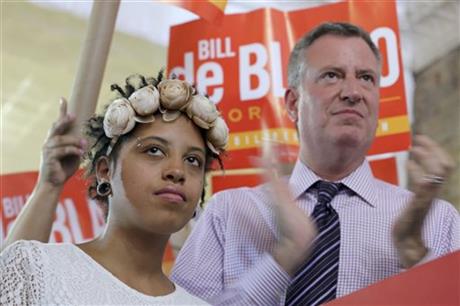
By JONATHAN LEMIRE
Democratic mayoral hopeful Bill de Blasio, right, is joined by his daughter Chiara, during a campaign rally in the Brooklyn borough of New York, Saturday, Sept. 7, 2013. The Democratic primary election is Tuesday, Sept. 10. (AP Photo/Mary Altaffer)
NEW YORK (AP) — New York City’s wild mayoral primary campaign hurtled to the voting booth Tuesday as New Yorkers begin the process of replacing the man who has led their city for 12 years.
Mayor Michael Bloomberg never offered an endorsement in the race, but the campaign has been defined by his legacy. The Republican mayoral hopefuls are largely promising to maintain his policies, while the Democrats have criticized the police department’s treatment of minorities and said he favored big business over the middle class.
Their front-runner, public advocate Bill de Blasio, is pitching himself as the cleanest break with the current administration. And while just weeks ago his campaign was an afterthought, he now has a legitimate shot of surging right past the 40 percent mark that would avoid a runoff three weeks from now.
“He’s the candidate that represents the most change,” said Joshua Bauchner, 40, an attorney who voted in Harlem for de Blasio.
In a Quinnipiac University poll released Monday, de Blasio was the choice of 39 percent of likely Democratic voters. If no one reaches 40 percent, the top two finishers advance to an Oct. 1 runoff.
De Blasio’s rise was as sudden as it was unexpected. He benefited from placing his interracial family at the heart of his campaign, connecting with voters over the need for NYPD reforms, and by drawing away voters from Anthony Weiner supporters following the former congressman’s latest sexting scandal.
If de Blasio’s support holds, the other spot in the potential runoff appears to be a matchup between City Council Speaker Christine Quinn and former comptroller Bill Thompson.
“I think she’s got the experience from working with Bloomberg,” said Lupe Moreno, 65, a real estate broker, who voted in Harlem for Quinn.
Quinn, who is bidding to become the city’s first female and first openly gay mayor, led the polls for most of the year but has seen support disappear as her rivals have repeatedly linked her to the bitter debate to let Bloomberg run for a third term in 2009.
The mayor’s opponent that year was Thompson, who stunned the political world by nearly upsetting the billionaire incumbent. The race’s lone African-American, Thompson has said he is counting on winning the bulk of black and Latino voters to propel him to the runoff.
On Tuesday, Harlem voter Joe Beverly said he would not decide between Thompson and de Blasio until he was in the booth.
“Two very good candidates,” said Beverly. “The most important issue to me is city economics and the disparity, the tale of two cities, rich and poor; stop and frisk the way the police act, and the future of the city.”
Election experts estimate that minority voters will make up more than half the Democratic primary electorate. Most polls have Quinn and Thompson within a few points of each other.
Weiner jolted the race in May when he ended his self-imposed political exile that began when he resigned from Congress in 2011 after sending lewd online messages to women who were not his wife. He led the polls for nearly a month only to tumble when it was revealed that he had continued to send the explicit messages in the months after leaving office.
The comptroller, John Liu, is bidding to become the city’s first Asian-American mayor but has been dogged by a fundraising scandal. He has been polling in the single digits.
Republicans will look to continue an improbable winning streak. Though outnumbered by Democrats in the city 6-to-1, the GOP has won the last five mayoral elections. (Bloomberg was an independent running on the Republican line four years ago.)
Joe Lhota, the former MTA chairman who received acclaim for steering the transit agency through Superstorm Sandy last fall, has led the polls all campaign. A former deputy mayor to Rudolph Giuliani, Lhota has pledged to maintain the city’s record low crime rates.
His primary challenger is John Catsimatidis, a billionaire grocery store magnate who has unleashed a series of blistering attack ads on Lhota, including one that mocks the front runner for dismissing Port Authority police officers as “mall cops.” Catsimatidis has spent more than $4 million of his own money on the race, but that’s a far cry from the $102 million Bloomberg spent four years ago.
Bronx voter Michael Horan, 59, a retired teacher who voted for Catsimatidis, asserted that Lhota “caused a transit strike. He got the fare up sky high and then he left.” Horan also referenced the “insulting” depiction of “mall cops.”
Bronx voter Fabian Feliciano, a 43-year-old city social services worker called Lhota the best all-around candidate, adding, “He’ll really take care of the middle class.”
Also Tuesday, ex-Gov. Eliot Spitzer will be trying to make a political comeback in the Democratic primary for city comptroller. Seeking to rebuild a political career devastated by a prostitution scandal, Spitzer is taking on Scott Stringer, Manhattan’s borough president.
Polls close at 9 p.m. Experts do not believe turnout will be high.
___
Associated Press video journalist Ted Shaffrey and Associated Press writer Jim Fitzgerald contributed to this report.
___



